Last October, Ben Sisaro, wrote an article in the New York Times entitled “Looking To A Sneaker for A Band’s Big Break,” (you can read it HERE) that articulates well how this is working in the music industry. Here are a few quotes from the article:
“And while a generation ago these arrangements [with corporations] would have carried a stigma for the artists, branding deals are now as common in rock as guitars…Converse’s studio, called Converse Rubber Tracks, is the brainchild of Geoff Cottrill, the company’s chief marketing officer…After applying online, bands deemed dedicated and needy enough will be able to record whatever they want there…Converse says it will have no influence on the music, the artists will keep ownership rights, and, as with many brand-as-patron projects, the songs aren’t intended to be used in ads. Mr. Cottrill said the company wants to “give back” to its loyal customers, but of course the enterprise is not purely altruistic. The idea is that helping new bands will build good will for the brand (and generate future sales) and also give Converse an advantage over all the other companies out there competing for young eyeballs…Mr. Cottrill suggested that the long-term success of Rubber Tracks would depend less on whether the bands that record there go on to fame and fortune than on the extent to which they keep Converse in their heart. ‘Let’s say over the next five years we put 1,000 artists through here, and one becomes the next Radiohead,’ he said. ‘They’re going to have all the big brands chasing them to sponsor their tour. But the 999 artists who don’t make it, the ones who tend to get forgotten about, they’ll never forget us.'”
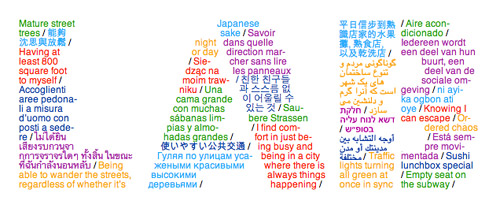
So what are we to make of BMW Guggenheim Lab which describes itself as:
“…The theme of the Lab’s first two-year cycle is Confronting Comfort—exploring notions of individual and collective comfort and the urgent need for environmental and social responsibility…Part urban think tank, part community center and public gathering space, the Lab is conceived to inspire public discourse in cities around the world …The public is invited to attend and to participate in free programs and experiments at the Lab…”
Many friends and respected colleagues are participating in the space and providing worthwhile content. (I’m not sure if content providers/artists get paid or not.) This brand identification with artists and ideas is slightly different from the Converse example in that many of the participating cultural producers could neither afford, nor may even desire a luxury car (while many of them do sport Van’s, Converse, and Levi’s as do I.) BMW does share with Converse their appreciation for artistic expression, in their press release, they write: “The BMW Group guarantees absolute creative freedom in all the cultural activities it is involved in—as this is just as essential for groundbreaking artistic work as it is for major innovations in a successful business.” The claims of interest in “environmental and social responsibility” coming from a luxury car company are part of the larger trend in greenwashing that we have seen by many polluting companies over the past several years. It is doubtful that an urban future based on individual luxury car ownership is a sustainable vision.
Regardless of experimental explorations of future sustainable practices, both companies, it seems, have recently been engaging in less than sustainable labor practices. The Teamsters have been protesting BMW (read more HERE) and the Guggenheim has been proliferating itself across the globe, but using questionable labor practices (read more HERE). Yet programming at the Lab includes a showing of the film The Take, about worker control in Argentina, as well as workshops and tours of worker controlled local businesses. In an article in The Art Newspaper, Richard Armstrong, the director of the Guggenheim is quoted as saying, “…BMW’s sponsorship affords the museum ‘the luxury of intellectual opportunity’.” (Wait, does he mean luxury cars afford us intellectual opportunities?) After watching The Take and learning how to set up a worker owned cooperative, it seems like a luxurious intellectual opportunity for the workers of both BMW and Guggenheim to occupy their workplaces and run them themselves! (Just expressing my experimental sustainable vision.)

So does this participation by so many committed folks in a BMW-branded venue imply that corporate culture no longer sucks? or just sucks less? or is just another venue to express ideas in? or there are no alternatives? If it was only the BMW Lab or even in a car dealership would they feel the same way? Or is there something about the Guggenheim brand that makes it better? (For those who have art CV’s, it seems a worthwhile line to add.) Most argue that it is a way to reach new audiences with their critical and radical ideas. This may be true, but I remain confused about other impacts of expressing, creating, and distributing in branded spaces (including on social media).
Some of us try to avoid putting corporate, processed, food in our bodies but easily take a big swig of corporate culture if it’s “free” and giving us a “gift”—that free gift at this point being space for our social relations both virtual and physical from Facebook to the BMW Lab. Food seems to be the only area that it’s still okay to be a purist about in both critique and consumption habits. I read an article in the Village Voice recently (read HERE) about small batch whiskey distillers in Brooklyn. One maker said, “…for the most part, people have only been exposed to corporate whiskey.” It felt like a statement that a late 80’s punk musician might say about rock. I’ve been in many conversations where “corporate organics” are derided over the local or the small. Yet when it comes to culture, we can participate in the factory farm organics version while the small batch, locally-based producers continue to lose their spaces and struggle to survive. Increasingly, many of us are committed to going out of our way to know our food sources but throw our hands in the air in defeat when trying to deal with how culture and cultural capital work.
True, I myself have been a bit compromised lately, and corporate culture is readily available, just like processed food. These questions I have are as much about my life and habits as about larger social conditions. This is about what my milieu is ready to accept and ready to reject—it is a moment that I am trying to make sense of. But sometimes it feels like our lives are so complicated and full of contradictions that we can’t even critique astro-turf cultural manifestations when they allow space for grass roots voices without being written off as anachronistic or too idealistic.
I am not ready to give up critique of corporate culture or domination of our everyday lives. Over the past ten years, I am increasingly surprised by the amount of conversations I have had in which this (private corporate encroachment on all aspects of life) is seen as a done deal: “Why even bother thinking about it? Might as well make the best of it and use it to our advantage.” I get that argument, but I’m unclear about if that “taking advantage” part is truly possible. There is also a strain of thought and cultural production that would rather challenge those posing the critiques than challenge the dominant powers. There is an activist saying that is frequently repeated: “We are great at pointing out what we don’t like, but not good at proposing solutions.” In these examples of corporations as branded sponsors of community spaces, it is exactly our proposals toward some solutions (opening independent spaces, creating a vibrant self-motivated culture, etc.) that get co-opted, not our practices of critiquing the status quo. So are we to assume that corporate culture doesn’t suck because it is giving us access to things we once started and now can’t afford to maintain: bike shops, print shops, recording studios, experimental art spaces, etc? But what happens when the marketers have moved on to the next marketing methodology and we are left without their infrastructure, or ours?
—Dara Greenwald, 2011.
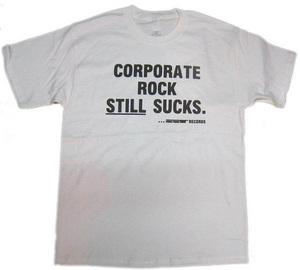
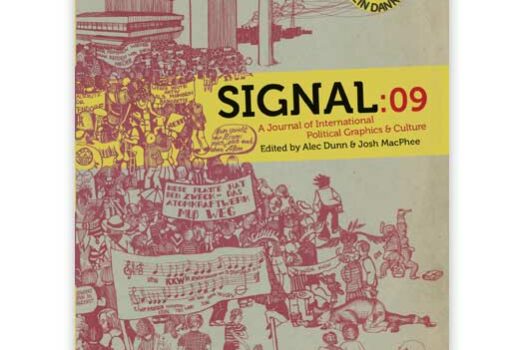
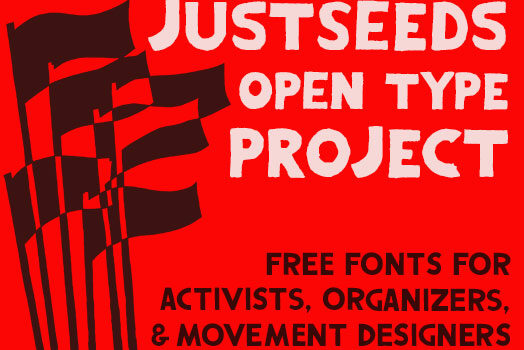


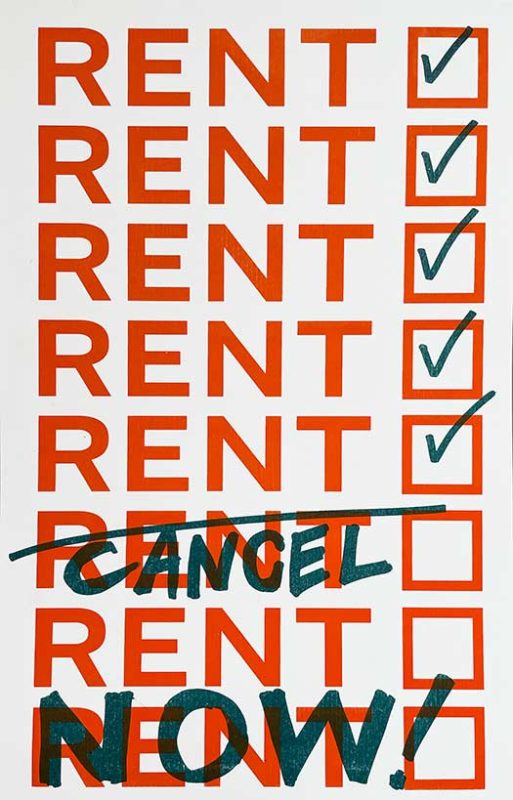



Your Heart is a Muscle the Size of a Canvas Sneaker!
Very well-written. I actually thought about this a lot recently while attending some of the Vans-sponsored free concerts in Greenpoint mentioned in the essay, so thanks for sharing.
Vans had brought together a pretty good line-up, so I couldn’t resist attending and also drinking their Heineken-sponsored free beer (no longer something as obvious as Pabst, what a shocker!). It did admittedly feel kind of lame seeing the likes of the Cro-mags at a corporate event. I thought to myself that this would in no way make me want to buy Vans shoes anymore than I already did. But then I thought that that’s not Vans’ intention (obviously).They wanted to imprint an image of their brand into my psyche. I am their new target market, the indie/punk music fan who might be smart enough to reject direct marketing and who is in denial about brand participation. And what’s the only way to reach people who fit that description? Give them what they want (the bands), and give it to them for free. How could they reject the brand after that? There were no shoe promos at the events, and no band members were sporting Vans sneakers, either.
Vans just want a positive association if nothing else, so next time I see their logo, I’ll remember how they champion holding “DIY” shows in warehouses and generously give out free beer to the masses (god that sounds ridiculous). So it’s no longer so black and white, this brand participation thing, and that is just kind of frightening.
I’m pretty sure corporate culture has sucked just as much as ever, corporations and their ‘coolhunters’ are just a bit smarter and sneakier now, and they are now appealing to me, something I begrudgingly admit.
Thank you for this, Dara. This is fantastic. I’m glad you’re asking the questions.
Hi Dara,
Thanks for this.
In reference to this part in particular:
“What I am talking about are the numerous, branded initiatives that offer people participatory and social experiences. Levi’s offers free filmmaking, photo, and printmaking workshops, Van’s hosts shows with some great musical acts, Urban Outfitters and Levi’s have a touring DIY bike shop, and Converse even has “a community based recording studio” (their words). Part of the ideals of independent and DIY culture is both access to the tools/means of production and to free spaces for creativity and communication. Are these corporate ventures really giving us a gift? Or are these poison gifts—and at what cost and to whom—since we know corporations main goals are their bottom lines?”
I often wonder if and how much these sorts of corporate ideas and offerings stem from people who grew up in diy/punk and activist sub-cultures assimilating into these corporate positions and implementing ideas that are influenced by their anti-corporate or just sub-cultural interests or previous interests.
I know a part of this is just basic recuperation of good ideas that people/communities respond too.
And then I wonder if there’s an element of naivete, where these corporate reps simply believe they can do “good” and “fun” things through using their corporate resources with out asking the question of “at what cost?”, and “who really benefits?”. They score points with their bosses and they get to work on “lesser evil” or even somewhat fun projects.
Perhaps it is a more “sinister” process… as this article spells out. But I think the machine is so ingrained, the sinister intentions of board room execs dont even necessitate strategy or discussion anymore – to a certain extent.
Echoing everyone above, thanks! My head started spinning when I read about BMW’s Lab and the new heights of recuperation, this essay—the first critical take on the Lab sponsorship/branding I’ve seen—has helped it slow down a bit….
Glad you are here to keep these questions going Dara. I’m reminded of a piece Nato wrote for JOAAP a while back on questions of style, etc, here: http://www.journalofaestheticsandprotest.org/4/nato.html
Anyway, I think you’re more than right to question notions of “tactical advantage”. The relationship between the “more ears” arg for music and the “more eyes” one for art (that is often wielded to justify otherwise obviously exploitative situations) seems pretty accurate. Why do we think more people seeing/hearing something is necessarily better? Isn’t reaching more people in increasingly standardized forms what got us where we are now? The product (even a politicized one) becomes a stand in for changed relationships…
Thanks for sharing these thoughts.
Hello Dara,
This is Martyna from Red Channels.
Thanks for writing this!
Red Channels is planning to organize the event “Confronting the Comfort of Corporate Sponsorhsip” – an open discussion with the radical community in New York.
There are enough reasons to reject BMW Guggenheim Lab, however the fact that many people who we respect as comrades are now participating in this show creates confusion and frustration. We don’t want to point fingers and blame the participants but take this situation as a starting point for a productive discussion that could lead to collective direct actions in the future.
Let’s stay in touch and see how we can collaborate.
Corporate DIY still sucks.
With regard to the presence of “committed” people at these corporate events: People participate with these flawed and compromised environments because they want to be a part of something happening, as opposed to something not happening. Being presented with the money and infrastructure with which to make things happen is a tantalizing prospect in the wake of several decades doing everything on the cheap in the most sustainably criminal manner. It’s not that corporate culture sucks any less now, but that its public presence is being presented by such canny and sophisticated departments. Has corporate culture, by studying the iconoclastic and isolated so intensively and for so long, become better at expressing DIY tropes than DIY itself?
Last night was my first experience of the BMW-branded venue. Walking in, I totally felt the confusion you describe in your article. Maybe more so, I don’t know? I mean after all, isn’t the whole place just a giant fucking rip on “alternative spaces” like the one I’ve been helping to run in Wb for the last 6 years? The whole thing just reeks of a scam to align the brand with a progressive culture. A tactic of making it look like they’re down with trying to make “the world a better place” while at the same time taking the attention away from the less than sustainable labor practices and Teamsters protests you mention. Having read your text I thought to myself, props to Dara for highlighting the glaring contradiction.
Regarding my response on FB.. When I say “we need to get over it”. What I mean is we need to get past this confused, yet critical, position. You raise the issue of how “We are great at pointing out what we don’t like, but not good at proposing solutions”. The question, and place we may not see eye to eye, is what that beyond-place or solution is. For me, the kind of examples you to point as alternatives “bike shops, print shops, recording studios, experimental art spaces, local food, DIY culture” etc are not it. That kind of corporate versus alternative polarization, I believe, loops us back immediately to a position where we will forever be shocked every time another one of our “alternatives” is integrated into a branding campaign. I personally take the position that we give up entirely on the myth of any kind of alternative that we believe exists as an alternative to corporations and engage Capitalism instead. From this perspective its not a question of If Capitalism sucks, it just does (period). Don’t ask the question, it’s not helpful to confuse the issue. And from this perspective, as far as I’m concerned, it’s not a question If something exists outside of Capitalism, it doesn’t. Everything (every solution that we will ever invent and be surprised that Capitalism incorporates) is already integrated (period). Start from here, and maybe we’ll get somewhere.
An example. Your example of The BMW Lab screening The Take is perfect. “After watching The Take and learning how to set up a worker owned cooperative, it seems like a luxurious intellectual opportunity for the workers of both BMW and Guggenheim to occupy their workplaces and run them themselves!” I totally agree. We need to occupy the BMW and Guggenheim! Which, to me, doesn’t mean we run away from the BMW space and go create our own DIY alternative galleries or car companies. It means occupation – inhabiting and taking over of the institution and running the mother-fucker. The Take needs to be taken to its logical conclusion. Force the contradiction and actualize the ideals that the Lab as co-opted. For me, a good example of where this kind of thing occurred was when The Tate invited The Laboratory of Insurrectionary Imagination to “run courses to develop new forms of creative disobedience”. The group accepted the invitation and exploited the opportunity to turn The Tate brand inside out and into what became the amazing Liberate Tate campaign. http://www.liberatetate.org/about.html. How are can you push an institution? Watch the Take!
“Isn’t there a relationship between from and content?” Absolutely, push the content so far up inside the ass of the institutional form that that institution gets turned inside out and becomes it’s own alternative.
Here in Michigan we are dealing with a slightly different issue. What about the moral issue of sponsorship?
In Grand Rapids, Michigan we have ‘ArtPrize’ billed as the largest international art prize competition with $450,000 in prize money awarded solely by popular vote. ArtPrize is founded by Rick Devos grandson to the founder of AmWay. Rick’s parent’s foundation The Dick and Betsy Devos Foundation fund ArtPrize. The Dick and Besty Devos Foundation is a evangelical, ultra conservative foundation that is politically active in fighting gay and lesbian rights, abortion, and spearheads national school voucher programs through variously named organizations.
In 2002 Dick Devos gave this speech to the Heritage Foundation calling for a quick concerted ” battle” to take conservative control of the educational system. http://www.youtube.com/watch?v=H-fTAhc4QC4 He also ran unsuccessfully for governor of Michigan on a platform of intelligent design being taught in the schools, discredited the idea of global warming, and vowed to end state environmental regulation for businesses.
ArtPrize brought in 7 million dollars in tourist spending to the city of Grand Rapids and is a referendum against the established art world acting as an ‘America Idol’ type art competition.
Would artists still apply to ArtPrize if they were aware of it’s sponsorship by this radically conservative foundation?
Great essay, Dara – we’re working on our own response to the Lab, we’ll let you know when it’s finished!
I think Converse Rubber Tracks studio is a great marketing idea. Corporate culture DOES still suck, but if I was in one of the bands that benefited I would be wholeheartedly in favor. There is less hypocrisy to the Converse campaign than, say, the BMW “greenwashing” (great term!) campaign.